French trainmaker Alstom estimates it will have an electric bus ready for the Singapore market by 2019 as it looks to road transport for growth.
The company's aim to diversify into other mobility businesses gained traction with its recently unveiled electric low-floor buses and autonomous shuttles.
Alstom has been heavily reliant on rail and related businesses, with 43 per cent of revenue currently attributable to this segment.
Mr Jean-Francois Beaudoin, Alstom's senior vice-president of Asia-Pacific, told The Straits Times: "We want to grow a new business - electric buses."
He said Alstom's recently launched Aptis battery-powered, low-floor buses offered "a tram-like service" and, unlike others, are designed and conceptualised as electric vehicles from the start.
Currently, two prototypes have been supplied to the French transport authority for assessment.
Mr Beaudoin said the company will target the "large market" in the Ile-de-France region, "which will lead the transformation from diesel buses to electric ones in France".
It is targeting Germany, the Netherlands, Belgium and Spain.
Alstom is also looking to introduce its e-buses in Singapore, and has informally presented the Aptis to the Land Transport Authority (LTA).
"There is a push from LTA to move towards electric buses," Mr Beaudoin said. "The product will require modifications to make it suitable for Singapore."
This is because "a lot of energy" will be used for air-conditioning. "This requires a different battery capacity while ensuring that costs do not become prohibitive," he said.
Nevertheless, he estimates that a product will be ready for Singapore by 2019.
Mr Beaudoin noted: "Alstom has already proven its technology leadership with metros and tramways, and we expect our entry into the electric bus market... to revolutionise urban transportation."
Elsewhere, the French group acquired a minority stake in EasyMile, a manufacturer of driverless shuttles, earlier this year. The €14 million (S$22.6 million) investment is part of Alstom's ambition to become a one-stop urban mobility solutions provider.
EasyMile operates an autonomous shuttle in Singapore's Gardens by the Bay, and in a business park in California.
It recently started similar operations in Taiwan, and is in talks to expand its presence there.
For the second quarter ended June 30, Alstom booked €1.9 billion of orders, compared with €900 million over the same period last year.
The company stated that sales, at €1.9 billion, were up 5 per cent organically over the first quarter of this year.
It added that by 2020, adjusted Ebit (earnings before interest and tax) margin should reach around 7 per cent, up from an average of 5.3 in the last three years.



